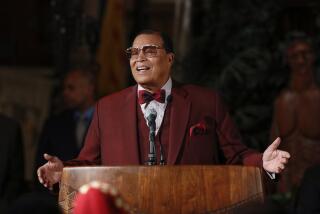Jackson Says He Will Not Accept Farrakhan’s Support
- Share via
WASHINGTON — The Rev. Jesse Jackson, civil rights leader and Democratic presidential aspirant, said Friday that he will not accept support from Black Muslim leader Louis A. Farrakhan, whose vitriolic remarks about Judaism and Adolf Hitler stirred controversy during Jackson’s 1984 campaign.
“Some of his positions are anti-Semitic,” Jackson acknowledged in response to questions at a breakfast with reporters here. “And it is fair to say that we must stand against anti-Semitism and racism and bigotry and sexism.
‘Not a Factor’
“We do not accept Farrakhan’s support,” Jackson said. “We haven’t sought his support. He is not a factor in our campaign.”
‘Hymie’ Remark
In 1984, Jackson’s association with Farrakhan, along with his own comment to a reporter describing New York City as “Hymie town,” led to charges of anti-Semitism leveled against his candidacy. And his supporters contended that such charges were a major reason why Jackson was unable to attract the support of a significant number of white liberal voters, who they believed would otherwise have backed him.
Farrakhan publicly described Hitler as “a great man” and called Judaism “a dirty religion.” Jackson disavowed those remarks but he declined to repudiate Farrakhan himself.
The controversy surrounding Jackson created such a strain that party leaders sidetracked a resolution condemning anti-Semitism and racism at the 1984 convention because, backers of the resolution contended, they feared that it would be viewed as a slap at Jackson.
His comments Friday appeared to be part of a continuing effort to alleviate bad feelings left over about this issue from the 1984 campaign and, more generally, to gain acceptance as a mainstream Democrat. Jackson referred to a number of meetings that he has had with Jewish leaders and groups in recent months.
‘Try to Reach Out’
“When there is a gap I try to reach out,” he said. “Many Jewish friends have commented on the effort we have made to reach out, and we will keep reaching out and trying to find common ground.”
He also mentioned that he had been getting political advice from Ann Lewis, national director of Americans for Democratic Action, who has well-established credentials with traditional liberal groups in the party and who, as Jackson pointed out, is Jewish.
Would Consider VP Spot
In another apparent indication of his interest in easing past tensions with Democratic regulars, Jackson said that he would consider an offer to run as vice president on the 1988 ticket. “A position on the ticket is an opportunity that must be regarded very highly,” he said.
He recalled the acceptance by Lyndon B. Johnson, then-majority leader in the Senate, of John F. Kennedy’s offer to be Kennedy’s running mate in 1960. Jackson said that if Johnson could accept that position “as honorable and good, then I would have to consider it as well.”
Gesture May Be Needed
The question arose because some analysts believe that while Jackson has scant chance to win the nomination, he may run so strongly, particularly in the South, that Democrats may need to make a gesture to him and his supporters for the sake of party harmony.
Ordinarily, presidential contenders reject any possibility of their accepting second place on the ticket out of fear that it would damage the hopes and confidence of their supporters. In Jackson’s case, though, the psychology could operate the other way: Some potential supporters who might be reluctant to vote for him because his chances of being nominated are slim might be willing to give him their ballots if they believe that he has a chance to be vice president.
More to Read
Sign up for Essential California
The most important California stories and recommendations in your inbox every morning.
You may occasionally receive promotional content from the Los Angeles Times.










